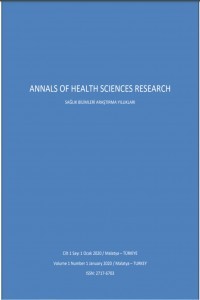Engelli Çocuğu Olan Ailelerin Yaşam Kalitesi
Engellilik, Engelli çocuklar, Yaşam Kalitesi, Engelli Aileler
Life Quality of Families With Disabled Children
___
- 1. Artar Y, Karabacakoglu C. Production of Orthesis and Wheelchairs, Standards and Market Potential. Ankara. 2003.
- 2. Sandalci F. Families with Disabled Children and Social Service Profession, Beyond the Horizon Science Magazine 2002; 2 (1): 80-90.
- 3. Gokcan K. Psycho-Social Situation of Families with Disabled Children and Development of Life Skills of Children with Disabilities. http://www.engelliler.biz/akademik/ocsapsdvocybg.htm (access date: 20.03.2006).
- 4. Akcakin M, Erden G. "Mental Symptoms of Parents of Children Diagnosed with Autism". Child Mental Health Magazine 2001; 8(1): 2-10.
- 5. Ozsenol F, Isikhan V, Unal B, Aydin IH, Akin R, Gokcay E. Evaluation of Family Functionality of Families with Disabled Children. Gulhane Medical Magazine 2003; 45 (2): 156-64
- 6. Turkish Statistics Institution 7 th Disabled Statistics Report, 2002, http://www.tuik.gov.tr/PreTablo.do?alt_id=1017 (access date: 02.02.2006).
- 7. General Population Count of T.R. Prime Ministry State Statistics Institution, 2000.
- 8. Esdaile S.A, Greenwood KM. “A Comparison of Mothers’ and Fathers’ Experience of parenting Stress and attributions for Parent Child Interaction Outcomes”. Therapy Int 2003; 10 (2): 115-26.
- 9. Uguz S, Toros F, Yazgan IB, Colakkadioglu O. “Determining the Levels of Anxiety, Depression, Stress in Mothers of Children with Intellectual and/or Physical Disabilities”. Clin Psychiat 2004; 7: 42-47.
- 10. Glidden LM, Schoolcraft SA. “Depression: Its Trajectory and correlates in mothers rearing children with Intellectual Disability”. J Intellect Disabil Res 2003; 47(4-5): 250-63.
- 11. Hastings RP.“Child Behaviour Problems and Partner Mental Health as Correlates of Stress in Mothers and Fathers of Children with Autism”. J Intellect Disabil Res 2003;47(4-5): 231-237.
- 12. Beser E, Atasoylu G, Akgoz EF, Cullu E. Prevalence, Etiology and Social Dimension of Disability in the Aydin Regional Center. Public Health Bulletin 2006; 5(4): 267-75.
- 13. Yılmaz Z. Problems Encountered by Working Disabled Individuals and Factors Affecting Them. Prime Ministry Department of Disabled Individuals, Ankara 2005.
- 14. Lafci D, Oztunc G, Alparslan ZN. Determining the Difficulties Experienced by Parents of Children with Intellectual Disabilities (Children with Mental Retardation). Gumushane University Health Sciences Magazine 2014; 3(2): 723-35.
- 15. Bahar A, Bahar G, Savas HA, Parlar S. Determining the Levels of Depression and Anxiety in Mothers of Disabled Children and the Methods of Dealing with Stress. Firat Health Services Magazine 2009; 4(11): 97- 122.
- 16. Uskun E, Ozturk M, Kisioglu NM. Epidemiology of Disability, Invalidity and Impairment in the Isparta Region. Health and Society Magazine 2005; 19(3): 90- 100.
- 17. Turkey Research on Disabled Individuals. http://www.tsd.org.tr/istatistik/ Engelli_Istatistikleri (access date: 28.03.2006)
- 18. Ozsoy S, Ozkahraman S, Calli F. Examining the Difficulties Experienced by Families with Intellectually Impaired Children. Three-Month Magazine 2006; 3(9): 71.
- 19. Chaud NM, Barbosa MA. Gomes FMM. Experiences of mothers of disabled children: a phenomenological study. Acta Paulista de Enfermagem 2008; 21(1): 46- 52.
- 20. The Interactive Autism Network (IAN) Research Report: Family Stress – Part 1, http://www.autismspeaks.org/news/news-item/ianresearch-report-family-stress-—-part-1 (access date: 03.01.2006)
- 21. Mulroy S, Robertson L, Aibert K, Leonard H, Bower C. The impact of having a sibling with an intellectual disability: parental perspectives in two Disorders. J Intellect Disabil Res 2008; 52(3), 216-29.
- 22. Macks RJ, Reeve RE. The Adjustment of NonDisabled Siblings of Children with Autism. J Autism Develop Disord 2007; 37(6), 1060-67.
- 23. Emek B, Dag I. Dealing with Stress and Comparison of the Control Focus in Mothers of Children with and without Educatable Intellectual Disabilities. Youth Mental Health Magazine 2005; 12(2): 56-68..
- Başlangıç: 2012
- Yayıncı: İnönü Üniversitesi
Nadir Karşılaşılan Bir Endodontik Problem: Radiks Entomolaris
Üniversite Öğrencilerinin Stresle Başa Çıkma Tarzlarının Menstrual Düzensizliğe Etkisi
Yeşim AKSOY DERYA, Sermin Timur TAŞHAN, Tuba UÇAR
Nedenleri ve Sonuçlarıyla Doğum Korkusu
Cinsel İstismar Mağduru Çocuklarla Çalışan Uzmanların Gözünden Mağdur Çocukların Özellikleri
Zekeriya ÇALIŞKAN, Mehmet SAĞLAM
Atların Terapötik lı Kullanımı
Abdurrahman KÖSEMAN, İbrahim ŞEKER
Yasir Furkan ÇAĞIN, Yüksel SEÇKİN, Emin BODAKÇİ, Mahmut ŞAHİN
Oral Premalign Lezyonların Teşhis Yöntemleri
Fahrettin KALABALİK, Elif Tarım ERTAŞ
Kronik Hastalığı Olan Çocuğa Sahip Ebeveynlerin Bakım Verme Yükü
Nesrin Ağkaya ALAHAN, Rukuye AYLAZ, Gülsüm YETİŞ
Genel Cerrahi Hastalarında Ameliyat Sonrası Konstipasyon Riski
